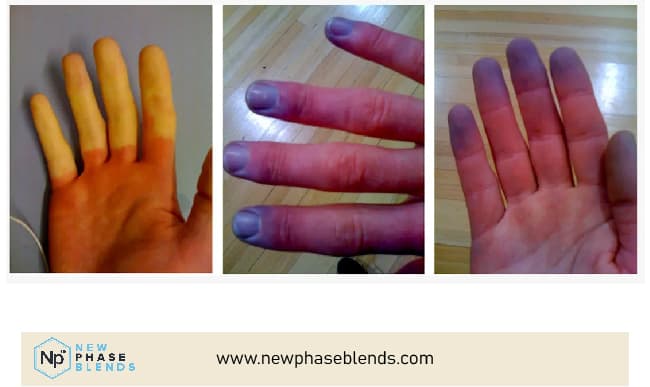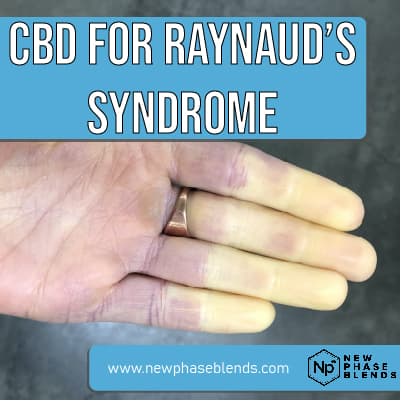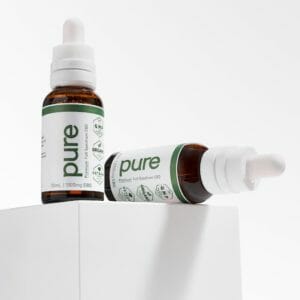Living with Raynaud’s syndrome means dealing with painful, cold fingers and toes that can disrupt your daily life. If you’re among the millions searching for relief beyond conventional treatments, CBD may have caught your attention as a potential alternative. This guide explores the relationship between CBD and Raynaud’s syndrome, specifically focusing on how CBD capsules might help manage symptoms of this circulatory condition. Drawing from current research and understanding of CBD’s properties, we’ll examine the potential benefits, considerations, and practical information you need to make informed decisions about using CBD for Raynaud’s syndrome.
How CBD May Help Raynaud’s Symptoms
CBD (cannabidiol) is a non-psychoactive compound derived from the cannabis plant that has gained attention for its potential therapeutic properties. Several mechanisms may explain why CBD could potentially benefit people with Raynaud’s syndrome:
Vasodilation Effects
One of the core problems in Raynaud’s syndrome is vasoconstriction—the narrowing of blood vessels that restricts blood flow. Research suggests that CBD may promote vasodilation through its interaction with the endocannabinoid system, which plays a role in regulating vascular tension. This potential vasodilating effect could theoretically help counteract the vessel narrowing that occurs during Raynaud’s episodes.
Anti-inflammatory Properties of CBD

Inflammation can worsen Raynaud’s symptoms, particularly during the reperfusion phase when blood flow returns to the affected areas. CBD has demonstrated significant anti-inflammatory effects in multiple studies, potentially helping to reduce the inflammation associated with Raynaud’s attacks.
Stress Reduction With CBD
Stress is a known trigger for Raynaud’s episodes. CBD’s reported anxiolytic (anxiety-reducing) properties might help manage stress levels, potentially reducing the frequency of stress-triggered episodes.
Understanding Raynaud’s Syndrome
Raynaud’s syndrome (also called Raynaud’s phenomenon or disease) affects roughly 5-10% of the population and occurs when blood vessels in your extremities overreact to cold temperatures or stress. During an episode, the small arteries that supply blood to your skin narrow, limiting blood circulation to affected areas. This causes the characteristic color changes—typically white, then blue, and finally red—along with numbness, tingling, and pain.
Primary vs. Secondary Raynaud’s
Raynaud’s syndrome comes in two forms. Primary Raynaud’s occurs on its own without an underlying medical condition and tends to be less severe. Secondary Raynaud’s develops as a complication of another health issue, often autoimmune disorders like lupus or scleroderma, and typically involves more intense symptoms.
Current Research on CBD in Treating Raynaud’s Syndrome
It’s important to note that research specifically examining CBD for Raynaud’s syndrome remains limited. Most potential benefits are extrapolated from CBD’s general properties and studies on related conditions:
- Research has shown CBD’s effects on blood vessel function and blood pressure regulation
- Studies demonstrate CBD’s anti-inflammatory properties in various inflammatory conditions
- Clinical trials have documented CBD’s potential to reduce anxiety and stress responses
However, direct clinical studies focusing specifically on CBD for Raynaud’s syndrome are still needed to establish definitive evidence of effectiveness.
Practical Considerations for Using CBD Capsules
If you’re considering CBD capsules for Raynaud’s syndrome, here are some important factors to keep in mind:
Dosage Guidelines
Finding the right CBD dosage is highly individual. Most experts recommend starting with a low dose (5-10mg) and gradually increasing until you find symptom relief. CBD capsules typically come in pre-measured doses, making this process more straightforward compared to other forms like oils.
Quality and Product Selection
The CBD market remains largely unregulated, making product quality variable. When selecting CBD capsules:
- Look for products with third-party lab testing (Certificate of Analysis)
- Check for full-spectrum, broad-spectrum, or CBD isolate formulations
- Verify the CBD concentration per capsule
- Ensure the product is free from harmful contaminants
Potential Side Effects
While generally considered well-tolerated, CBD can cause side effects in some individuals, including:
- Digestive discomfort
- Fatigue
- Changes in appetite
- Potential interactions with other medications
Always consult with a healthcare provider before starting CBD, especially if you’re taking other medications.
Integrating CBD Into Your Raynaud’s Management Plan
CBD should be viewed as a potential complementary approach rather than a replacement for conventional Raynaud’s treatments.
Complementary Approaches
Consider using CBD alongside other management strategies:
- Maintaining core body temperature with appropriate clothing
- Practicing stress reduction techniques
- Following your prescribed medication regimen
- Making recommended lifestyle modifications
Tracking Your Results
Keep a journal documenting your Raynaud’s episodes, noting:
- Frequency and severity of attacks
- Triggers that preceded episodes
- CBD dosage and timing
- Changes in symptoms after CBD use
This information can help you and your healthcare provider evaluate whether CBD is providing meaningful benefits.
Common Misconceptions About CBD for Raynaud’s
There are several misconceptions worth addressing:
“CBD Will Completely Cure Raynaud’s”
While CBD may help manage symptoms, there’s no evidence it can cure Raynaud’s syndrome. Expectations should be realistic—focusing on symptom management rather than complete resolution.
“All CBD Products Are Equally Effective”
Product quality, formulation, and individual body chemistry all influence effectiveness. What works for one person may not work for another.
Final Thoughts on CBD and Raynaud’s Phenomenon
CBD represents a potentially promising option for people with Raynaud’s syndrome looking for additional ways to manage their symptoms. While current research is encouraging in related areas, more specific studies are needed to fully understand CBD’s effectiveness for this condition.
If you’re considering CBD for Raynaud’s syndrome, approach it as part of a comprehensive management strategy developed in consultation with healthcare providers familiar with both your condition and CBD use. With careful product selection, appropriate dosing, and realistic expectations, CBD capsules may offer another tool in your effort to manage Raynaud’s syndrome symptoms.





















